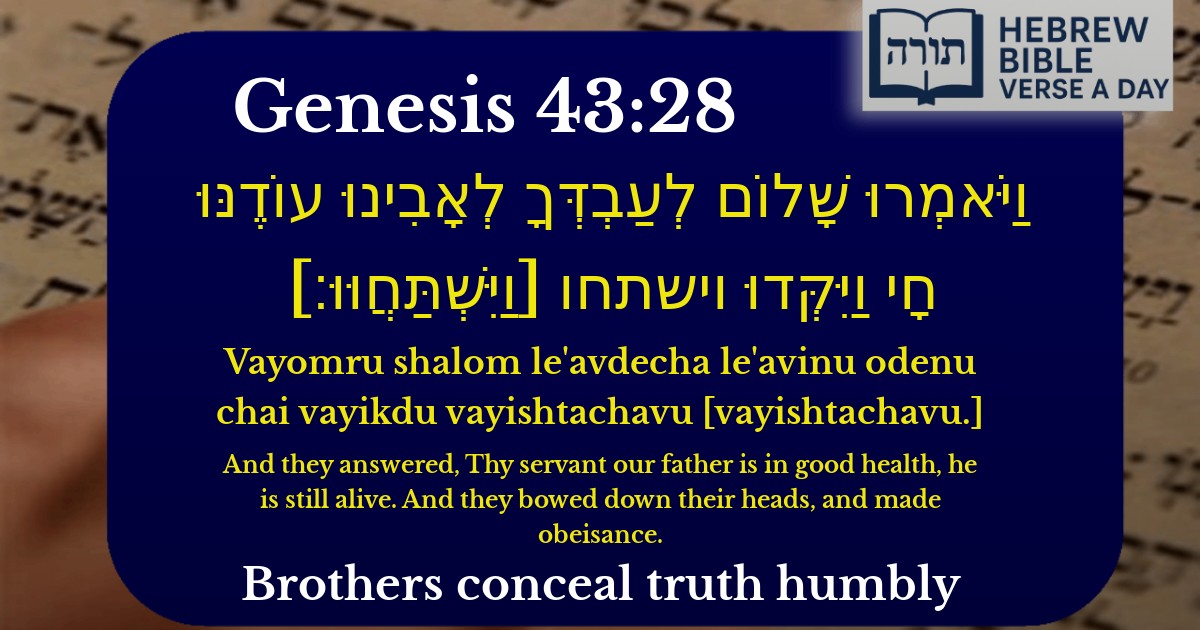Join Our Newsletter To Be Informed When New Videos Are Posted
Join the thousands of fellow Studends who rely on our videos to learn how to read the bible in Hebrew for free!
Hebrew Text
וַיֹּאמְרוּ שָׁלוֹם לְעַבְדְּךָ לְאָבִינוּ עוֹדֶנּוּ חָי וַיִּקְּדוּ וישתחו [וַיִּשְׁתַּחֲוּוּ׃]
English Translation
And they answered, Thy servant our father is in good health, he is still alive. And they bowed down their heads, and made obeisance.
Transliteration
Vayomru shalom le'avdecha le'avinu odenu chai vayikdu vayishtachavu [vayishtachavu.]
Hebrew Leining Text
וַיֹּאמְר֗וּ שָׁל֛וֹם לְעַבְדְּךָ֥ לְאָבִ֖ינוּ עוֹדֶ֣נּוּ חָ֑י וַֽיִּקְּד֖וּ <span class="mam-kq"><span class="mam-kq-k">(וישתחו)</span> <span class="mam-kq-q">[וַיִּֽשְׁתַּחֲוֽוּ]</span></span>׃
וַיֹּאמְר֗וּ שָׁל֛וֹם לְעַבְדְּךָ֥ לְאָבִ֖ינוּ עוֹדֶ֣נּוּ חָ֑י וַֽיִּקְּד֖וּ (וישתחו) [וַיִּֽשְׁתַּחֲוֽוּ]׃
🎵 Listen to leining
Parasha Commentary
📚 Talmud Citations
This verse is not quoted in the Talmud.


Context in the Story of Yosef and His Brothers
This verse (Bereshit 43:28) occurs when Yosef's brothers return to Egypt with Binyamin and respond to Yosef's inquiry about their father Yaakov. The brothers, unaware of Yosef's true identity, demonstrate respect and deference to the Egyptian viceroy (Yosef) by bowing, fulfilling Yosef's earlier dream (Bereshit 37:7-10).
Meaning of "Shalom" and Yaakov's Welfare
Rashi explains that the brothers' declaration "שָׁלוֹם" (shalom) indicates Yaakov was physically healthy ("בשלום") and spiritually whole ("שלם בתפילתו")—his prayer life remained intact despite his grief over Yosef. The Sforno adds that their emphasis on Yaakov being "עוֹדֶנּוּ חָי" (still alive) hints at his resilience despite years of sorrow, showing Divine protection over the forefathers.
The Act of Bowing: Fulfillment of Prophecy
The brothers' bowing ("וַיִּשְׁתַּחֲוּוּ") echoes Yosef's prophetic dreams (Bereshit 37:7-10). The Midrash (Bereshit Rabbah 93:10) notes that this was the second of eleven prostrations—symbolizing future subjugation before Mashiach (as per the Vilna Gaon). Ramban emphasizes that their bowing was a natural gesture of honor to a ruler, not realizing its deeper providential significance.
Halachic and Ethical Dimensions